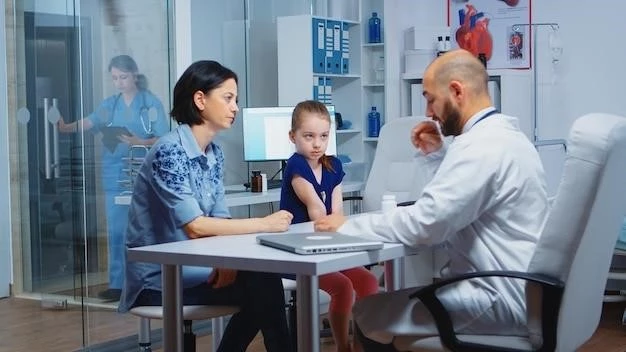Disease ─ Hemangiomatosis‚ Familial Pulmonary Capillary
When dealing with Familial Pulmonary Capillary Hemangiomatosis‚ it’s crucial to understand the impact of this rare genetic disorder on the blood vessels in the lungs․ Explore the symptoms‚ diagnosis‚ treatment options‚ and insights into living with this condition․
Overview of Familial Pulmonary Capillary Hemangiomatosis
Familial Pulmonary Capillary Hemangiomatosis is a rare genetic disorder characterized by the abnormal growth of blood vessels in the lungs․ These abnormal blood vessels‚ known as capillaries‚ can multiply uncontrollably and form clusters called hemangiomas․ Over time‚ these hemangiomas can impair the normal functioning of the lungs‚ leading to symptoms like shortness of breath‚ coughing up blood‚ chest pain‚ and fatigue․
Due to its rarity‚ Familial Pulmonary Capillary Hemangiomatosis can be challenging to diagnose accurately․ Doctors may use a combination of imaging tests‚ such as chest X-rays‚ CT scans‚ and pulmonary function tests‚ along with a lung biopsy to confirm the presence of hemangiomas in the lungs․
It’s important for individuals with a family history of this condition to be aware of the genetic component of Familial Pulmonary Capillary Hemangiomatosis․ The disorder is inherited in an autosomal dominant pattern‚ meaning that a person only needs to inherit one copy of the mutated gene from either parent to develop the condition․ Genetic counseling can help individuals understand their risk of passing the disorder to their children․
Managing Familial Pulmonary Capillary Hemangiomatosis involves a multidisciplinary approach‚ including pulmonologists‚ cardiologists‚ and genetic counselors․ Treatments may focus on relieving symptoms‚ improving lung function‚ and addressing complications that may arise․ Medications‚ oxygen therapy‚ and lung transplant surgery are some options that healthcare providers may consider based on the individual’s specific situation․
Overall‚ while living with Familial Pulmonary Capillary Hemangiomatosis can present challenges‚ advancements in research offer hope for improved understanding‚ management‚ and potentially new treatments for this rare vascular disorder affecting the lungs․
Symptoms and Diagnosis
Recognizing the symptoms of Familial Pulmonary Capillary Hemangiomatosis is crucial for early diagnosis and treatment․ Some common symptoms include shortness of breath‚ coughing up blood‚ chest pain‚ fatigue‚ and exercise intolerance․ If you or a loved one experience these symptoms‚ it’s essential to seek medical attention promptly․
Diagnosing Familial Pulmonary Capillary Hemangiomatosis often involves a series of tests to confirm the presence of abnormal blood vessels in the lungs․ Imaging studies like chest X-rays‚ CT scans‚ and MRI scans can provide detailed images of the lung structures‚ helping healthcare providers identify hemangiomas․ Pulmonary function tests measure lung capacity and efficiency‚ while a lung biopsy may be necessary to obtain a tissue sample for further analysis․
Due to the rare nature of this disorder‚ accurate diagnosis can be challenging․ It’s important to consult with a medical team experienced in treating rare lung conditions to ensure proper evaluation and management․ Keep a record of your symptoms‚ medical history‚ and any relevant family history to aid in the diagnostic process․
If you suspect Familial Pulmonary Capillary Hemangiomatosis based on your symptoms or family history‚ do not hesitate to discuss your concerns with a healthcare provider․ Early detection and diagnosis can lead to timely interventions to manage the condition effectively and improve the quality of life for individuals affected by this rare pulmonary vascular disorder․
Understanding the Genetic Component
When it comes to Familial Pulmonary Capillary Hemangiomatosis‚ understanding the genetic basis of this rare condition is essential․ This disorder is caused by mutations in certain genes that control the growth and development of blood vessels in the lungs․ The vascular abnormalities seen in this disorder are due to the abnormal proliferation of capillaries‚ leading to the formation of hemangiomas․
Familial Pulmonary Capillary Hemangiomatosis is inherited in an autosomal dominant pattern‚ meaning that a single copy of the mutated gene is sufficient for the disorder to manifest․ Individuals with a parent affected by the condition have a 50% chance of inheriting the mutated gene and developing Familial Pulmonary Capillary Hemangiomatosis․
Genetic testing and counseling play a crucial role in understanding the inheritance pattern of this disorder․ Genetic counselors can provide information about the risks of passing the mutated gene to future generations‚ as well as discuss available testing options for at-risk family members․
Individuals diagnosed with Familial Pulmonary Capillary Hemangiomatosis should consider genetic counseling not only for themselves but also for family planning purposes․ Understanding the genetic component of this disorder can help individuals make informed decisions about their health and the risk of passing the condition to their children․
By delving into the genetic component of Familial Pulmonary Capillary Hemangiomatosis‚ individuals and families affected by this rare vascular disorder can gain insights into the hereditary nature of the condition and take proactive steps towards managing their health and well-being․

Treatment Options
Managing Familial Pulmonary Capillary Hemangiomatosis involves a comprehensive approach tailored to the individual’s symptoms and overall health․ Treatment options aim to alleviate symptoms‚ improve lung function‚ and enhance quality of life for those affected by this rare disorder․
Medications such as diuretics‚ blood thinners‚ and medications to improve pulmonary hypertension may be prescribed to address specific symptoms associated with Familial Pulmonary Capillary Hemangiomatosis․ These medications can help manage fluid buildup in the lungs‚ prevent blood clots‚ and reduce the strain on the heart․
In some cases‚ oxygen therapy may be recommended to provide additional oxygen to the lungs and alleviate shortness of breath․ This can improve oxygen levels in the blood and reduce fatigue and other respiratory symptoms experienced by individuals with Familial Pulmonary Capillary Hemangiomatosis․
For individuals with advanced disease or severe symptoms‚ lung transplant surgery may be considered as a treatment option․ Lung transplantation can improve lung function and quality of life for eligible candidates‚ offering a potential long-term solution for those with progressive Familial Pulmonary Capillary Hemangiomatosis․
It’s essential for individuals diagnosed with Familial Pulmonary Capillary Hemangiomatosis to work closely with a healthcare team experienced in treating rare lung disorders․ Regular monitoring‚ follow-up appointments‚ and adjustments to treatment plans may be necessary to ensure optimal management of the condition and address any emerging complications․
Discussing treatment options with healthcare providers‚ staying informed about the latest advancements in managing Familial Pulmonary Capillary Hemangiomatosis‚ and maintaining open communication with your medical team are key steps in navigating the complexities of this genetic vascular disorder affecting the lungs․
Living with Familial Pulmonary Capillary Hemangiomatosis
Adjusting to life with Familial Pulmonary Capillary Hemangiomatosis can present unique challenges‚ but proactive management and self-care can help individuals navigate their daily routines while coping with this rare genetic vascular disorder affecting the lungs․
Developing a support network of healthcare providers‚ family members‚ and support groups can provide valuable assistance and emotional support for individuals living with Familial Pulmonary Capillary Hemangiomatosis․ Sharing experiences‚ concerns‚ and insights with others facing similar challenges can foster connections and offer encouragement․
Adopting healthy lifestyle habits‚ such as maintaining a balanced diet‚ engaging in regular physical activity within recommended limits‚ avoiding tobacco smoke and other respiratory irritants‚ and getting sufficient rest‚ can contribute to overall well-being and help manage symptoms associated with Familial Pulmonary Capillary Hemangiomatosis․
Educating oneself about the condition‚ staying up-to-date on treatment options‚ and actively participating in the management of the disorder by attending medical appointments‚ monitoring symptoms‚ and adhering to prescribed medications and therapies can empower individuals to take control of their health and improve their quality of life․
Emotional well-being is equally important when living with Familial Pulmonary Capillary Hemangiomatosis․ Seeking the support of mental health professionals‚ practicing stress-reducing techniques‚ and engaging in activities that promote relaxation and mindfulness can help individuals cope with the emotional challenges that may arise from managing a chronic and rare health condition․
By making informed decisions‚ prioritizing self-care‚ fostering a strong support system‚ and maintaining a positive outlook‚ individuals with Familial Pulmonary Capillary Hemangiomatosis can face the daily demands of the condition with resilience‚ courage‚ and hope for a fulfilling life despite the challenges it may present․
Future Research and Outlook
Research in the field of Familial Pulmonary Capillary Hemangiomatosis continues to expand our understanding of this rare genetic vascular disorder affecting the lungs․ Ongoing studies aim to uncover new insights into the underlying causes‚ progression of the disease‚ and potential treatment strategies that could improve outcomes for individuals living with this condition․
Advancements in genetic research may lead to the identification of novel gene targets associated with Familial Pulmonary Capillary Hemangiomatosis‚ paving the way for targeted therapies that can address the specific genetic abnormalities contributing to the disorder․ Precision medicine approaches tailored to individual genetic profiles may revolutionize the treatment of this rare condition in the future․
Clinical trials exploring innovative treatment modalities‚ such as gene therapy‚ stem cell-based therapies‚ and immunomodulatory agents‚ offer promising avenues for the development of new interventions that could modify the course of Familial Pulmonary Capillary Hemangiomatosis and provide more effective management options for affected individuals․
Collaboration among healthcare providers‚ researchers‚ advocacy groups‚ and individuals living with Familial Pulmonary Capillary Hemangiomatosis is essential to drive progress in the field‚ raise awareness about the condition‚ and advocate for increased support and resources for research initiatives focused on advancing the understanding and management of this rare disorder․
Looking ahead‚ the future outlook for individuals with Familial Pulmonary Capillary Hemangiomatosis holds promise for improved diagnostic tools‚ targeted therapies‚ and personalized treatment approaches that may enhance quality of life and ultimately lead to better outcomes for those affected by this challenging genetic vascular condition affecting the lungs․
